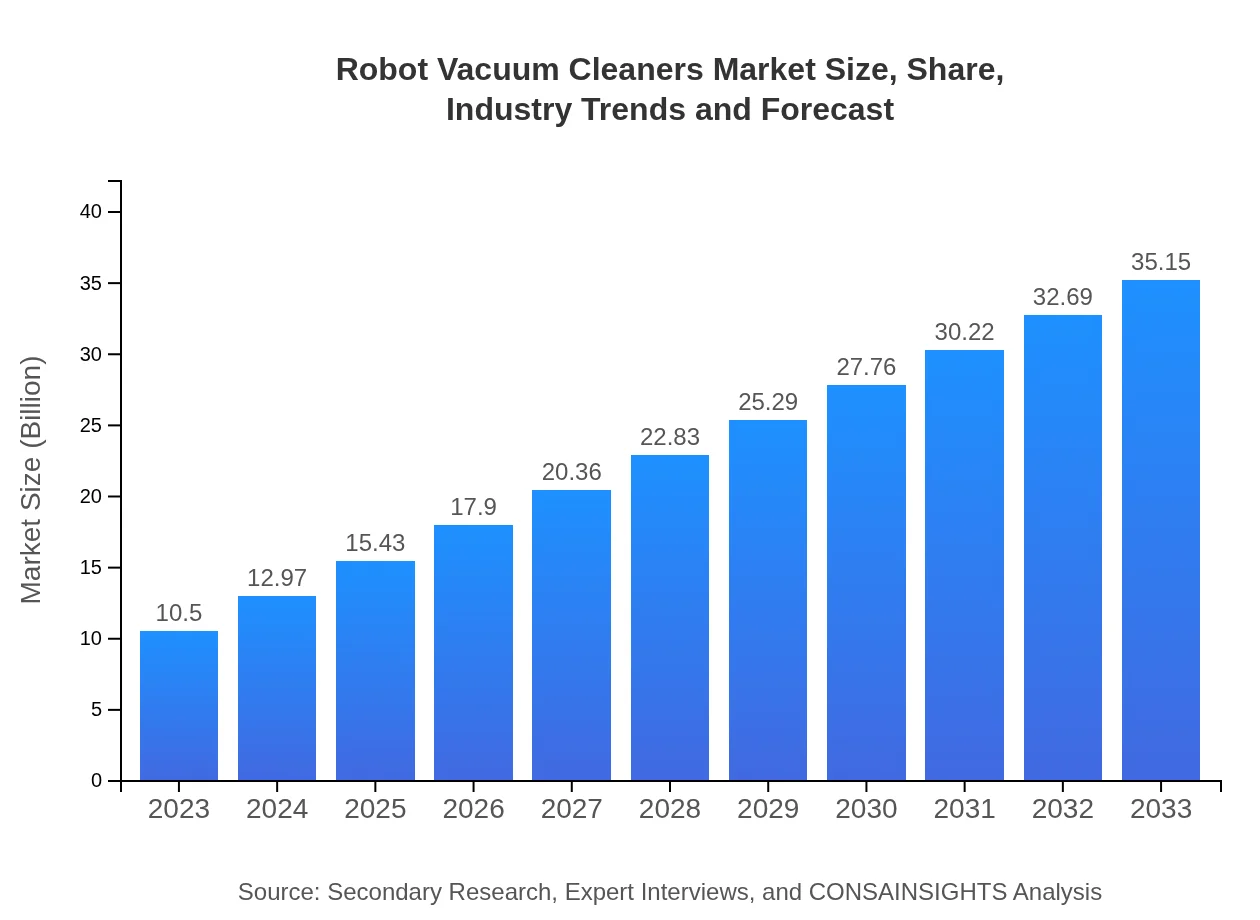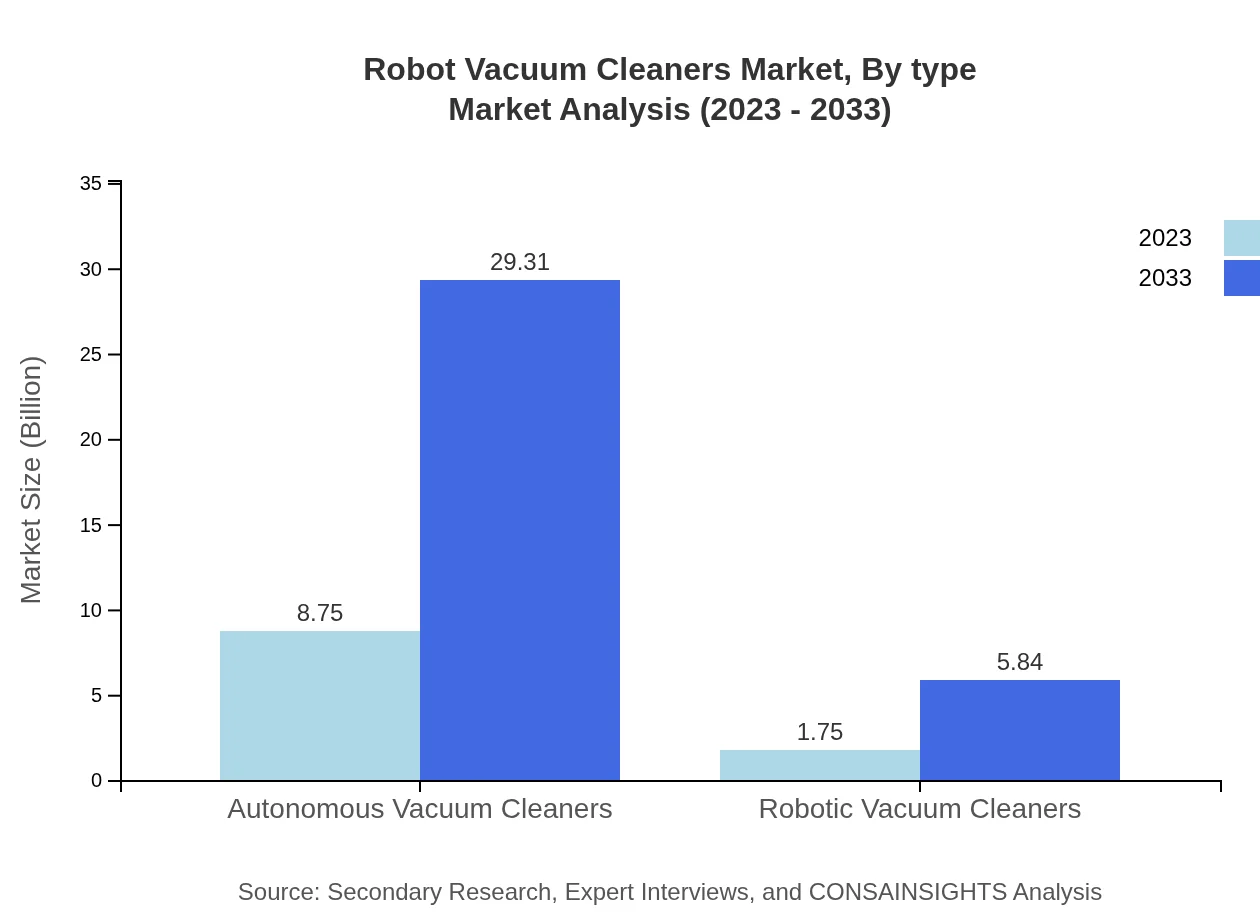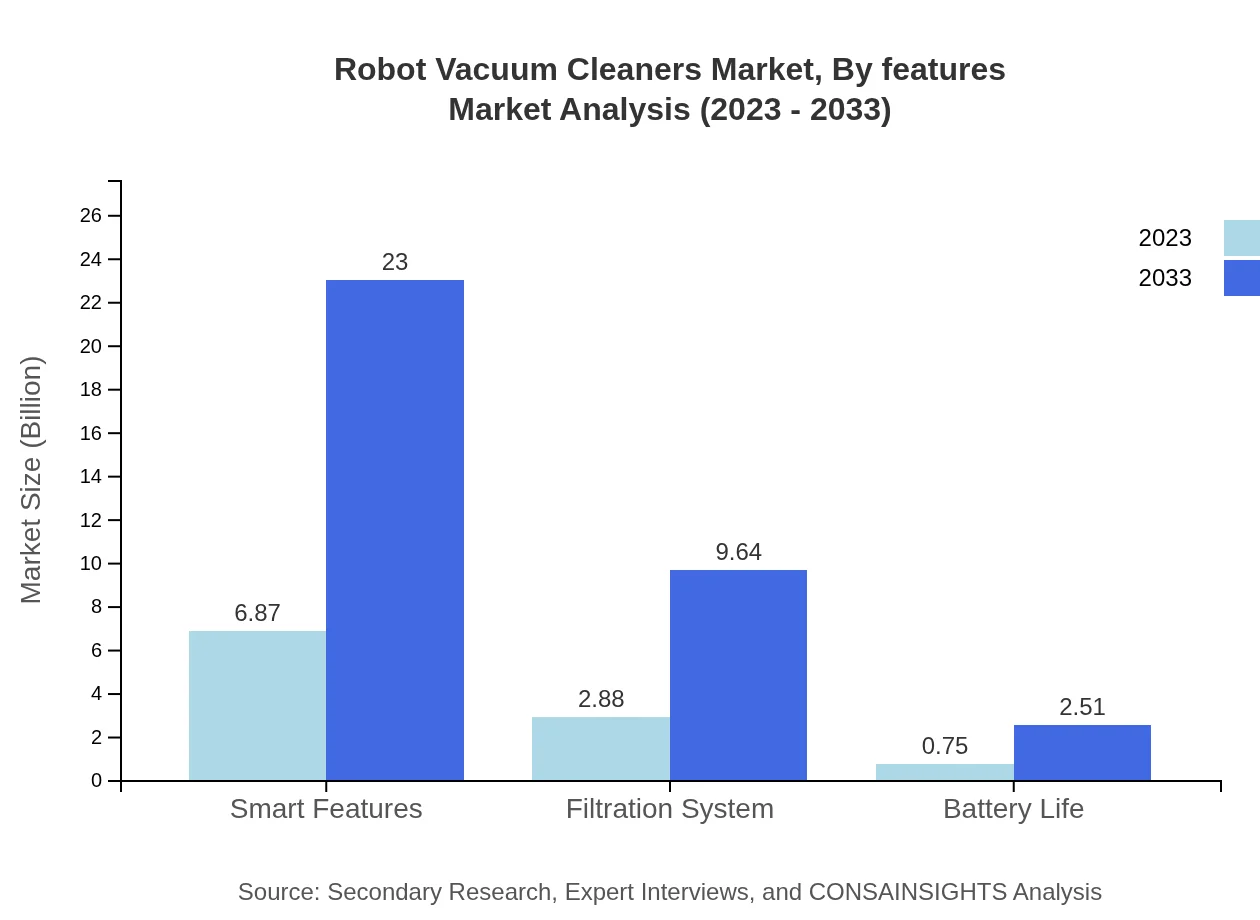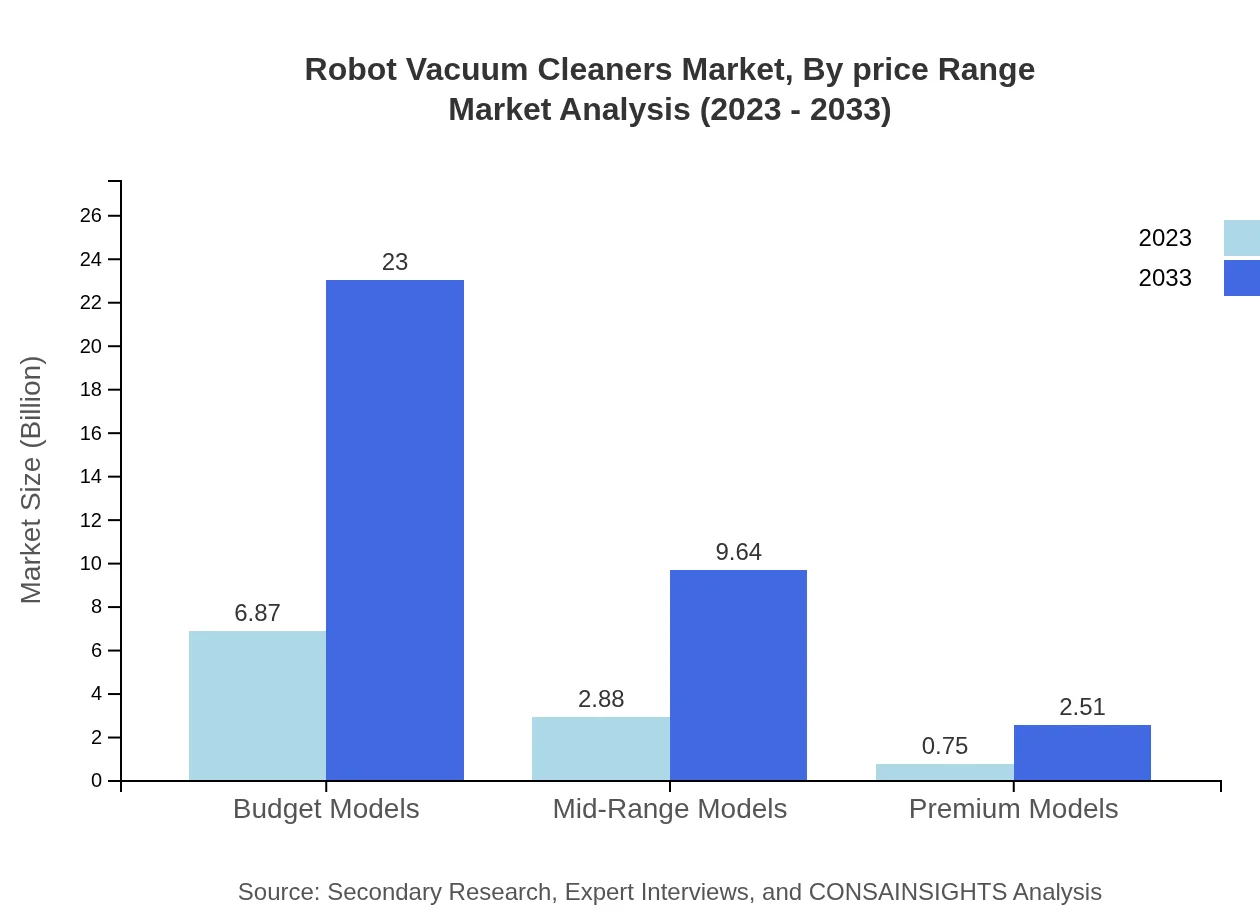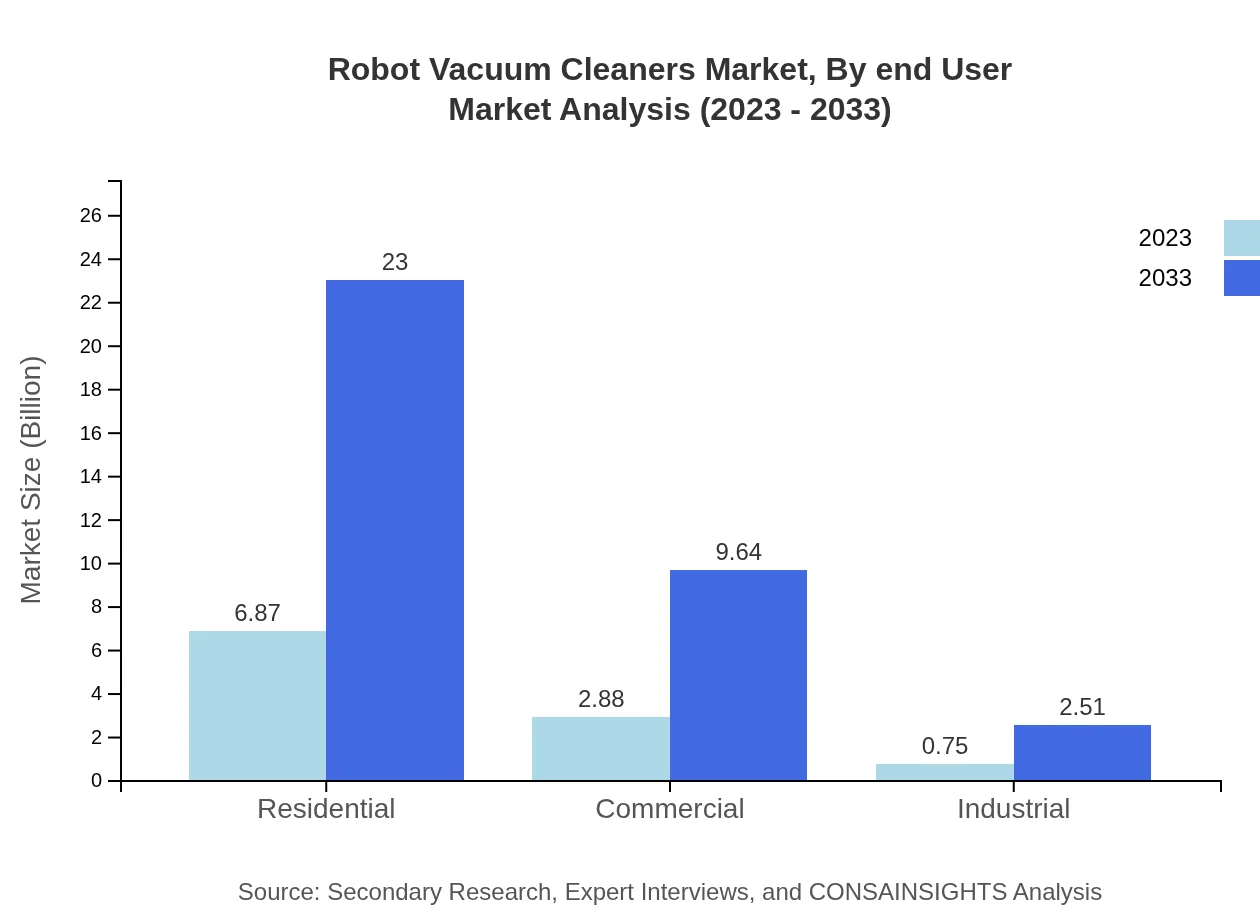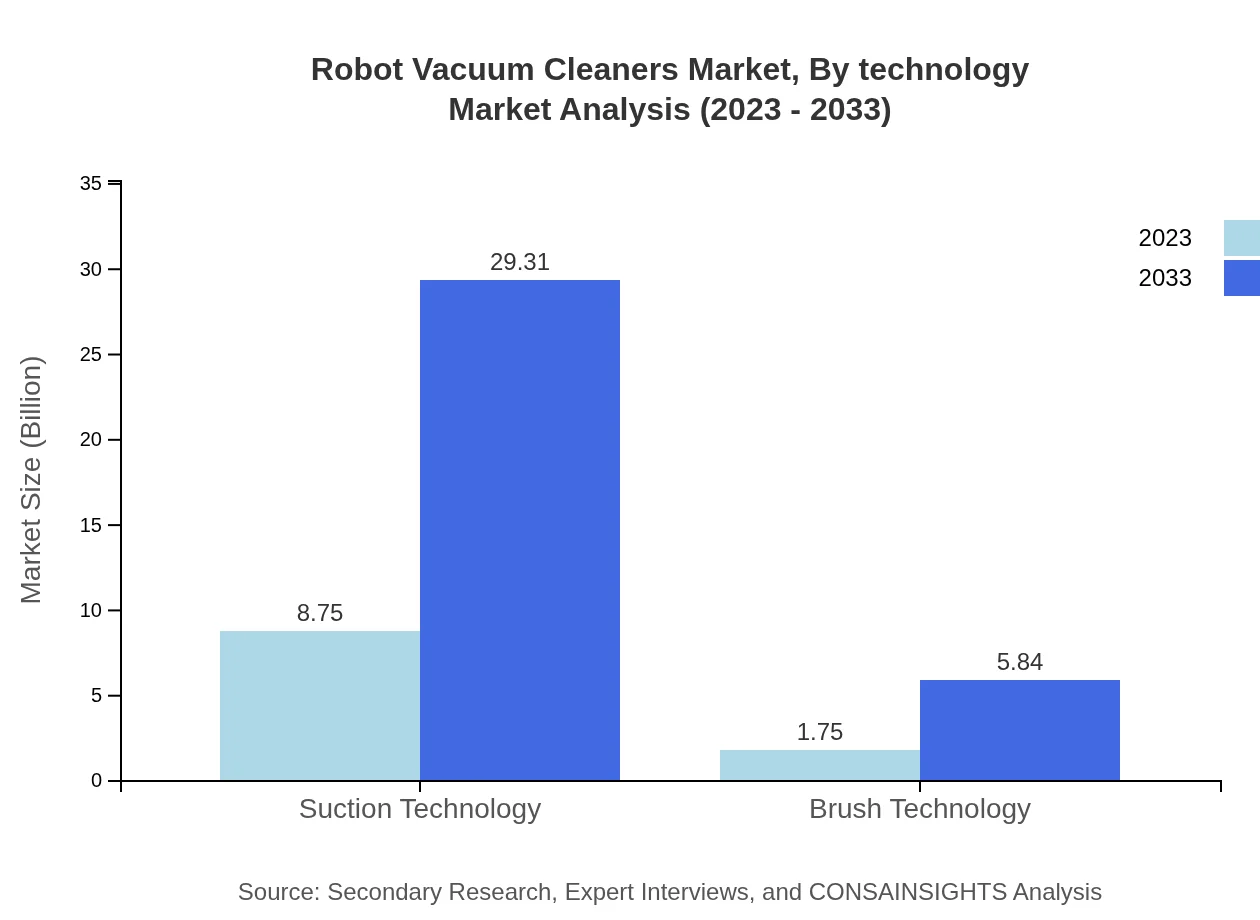Robot Vacuum Cleaners Market Report
Published Date: 22 January 2026 | Report Code: robot-vacuum-cleaners
Robot Vacuum Cleaners Market Size, Share, Industry Trends and Forecast to 2033
This report provides a comprehensive analysis of the Robot Vacuum Cleaners market, highlighting key trends, market size, growth projections, and regional differences from 2023 to 2033. Insights include market segmentation, innovation trends, and a competitive landscape overview of major players.
| Metric | Value |
|---|---|
| Study Period | 2023 - 2033 |
| 2023 Market Size | $10.50 Billion |
| CAGR (2023-2033) | 12.3% |
| 2033 Market Size | $35.15 Billion |
| Top Companies | iRobot Corporation, Ecovacs Robotics, Neato Robotics, SharkNinja Operating LLC, Roborock Technology Co., Ltd. |
| Last Modified Date | 22 January 2026 |
Robot Vacuum Cleaners Market Overview
Customize Robot Vacuum Cleaners Market Report market research report
- ✔ Get in-depth analysis of Robot Vacuum Cleaners market size, growth, and forecasts.
- ✔ Understand Robot Vacuum Cleaners's regional dynamics and industry-specific trends.
- ✔ Identify potential applications, end-user demand, and growth segments in Robot Vacuum Cleaners
What is the Market Size & CAGR of Robot Vacuum Cleaners market in 2023?
Robot Vacuum Cleaners Industry Analysis
Robot Vacuum Cleaners Market Segmentation and Scope
Tell us your focus area and get a customized research report.
Robot Vacuum Cleaners Market Analysis Report by Region
Europe Robot Vacuum Cleaners Market Report:
Europe's market is anticipated to expand from $2.77 billion in 2023 to $9.28 billion by 2033, driven by high living standards and increasing health concerns relating to cleanliness, motivating investments in robotic cleaning solutions.Asia Pacific Robot Vacuum Cleaners Market Report:
In the Asia Pacific region, the market size in 2023 is approximately $2.08 billion, expected to reach $6.97 billion by 2033, driven by burgeoning urban households and technological adoption. Countries like Japan and China lead in product demand due to high efficacy and interest in automation.North America Robot Vacuum Cleaners Market Report:
North America boasts a market size of $3.98 billion in 2023, expected to grow to $13.31 billion by 2033, benefitting from advanced marketing strategies, widespread smart home integration, and a high consumer inclination towards automated solutions.South America Robot Vacuum Cleaners Market Report:
The South American market is smaller, valued at around $0.52 billion in 2023, projected to grow to $1.74 billion by 2033. Growth is supported by increasing disposable income and rising awareness about cleaning technologies, though adoption rates are lower compared to other regions.Middle East & Africa Robot Vacuum Cleaners Market Report:
The Middle East and Africa region has a market size of $1.15 billion in 2023, projected to reach $3.85 billion by 2033, as urbanization and technology penetration grow, particularly in urban centers where demand for automation and convenience increases.Tell us your focus area and get a customized research report.
Robot Vacuum Cleaners Market Analysis By Type
The market is bifurcated into two main segments: Autonomous Vacuum Cleaners and Robotic Vacuum Cleaners. Autonomous Vacuum Cleaners will dominate market share with a size jump from $8.75 billion in 2023 to $29.31 billion by 2033, capturing 83.38% of the market. In contrast, Robotic Vacuum Cleaners exhibit substantial growth, increasing from $1.75 billion to $5.84 billion, reflecting a 16.62% share.
Robot Vacuum Cleaners Market Analysis By Features
The market demonstrates strong demand for advanced features, particularly in Smart Features which project growth from $6.87 billion to $23 billion, signifying a 65.42% share through 2033. Other notable features include Filtration Systems and Suction Technology, with their respective market sizes moving from $2.88 billion to $9.64 billion and $8.75 billion to $29.31 billion.
Robot Vacuum Cleaners Market Analysis By Price Range
Market segmentation by price reveals a significant experience in Budget Models, which will surge from $6.87 billion in 2023 to $23 billion by 2033, maintaining a 65.42% share. Mid-Range Models and Premium Models also build traction but remain lower in share and size.
Robot Vacuum Cleaners Market Analysis By End User
The residential sector leads the market with a size of $6.87 billion anticipated to rise to $23 billion by 2033, showcasing a commanding 65.42% share. Commercial applications grow distinctly as well, but they only contribute to 27.43% of the overall market share.
Robot Vacuum Cleaners Market Analysis By Technology
Technology plays a pivotal role in market growth, especially with Suction Technology commanding a significant portion, growing from $8.75 billion to $29.31 billion, whilst maintaining 83.38% share through 2033. Other technologies, such as Brush Technology, enhance the industry’s breadth but represent smaller segments of the overall market.
Robot Vacuum Cleaners Market Trends and Future Forecast
Tell us your focus area and get a customized research report.
Global Market Leaders and Top Companies in Robot Vacuum Cleaners Industry
iRobot Corporation:
A pioneer in the robotic vacuum cleaner market, iRobot is renowned for its Roomba series, combining smart technology with efficient cleaning capabilities.Ecovacs Robotics:
Recognized for high-quality robot vacuum cleaners, Ecovacs integrates advanced navigation and mapping technologies, making them a key player in the industry.Neato Robotics:
An innovator in the robotic cleaning sector, Neato is known for its unique D-shape design that enhances corner cleaning efficiency.SharkNinja Operating LLC:
SharkNinja focuses on versatile vacuum solutions combining robotic technology with traditional vacuuming, catering to a broad consumer base.Roborock Technology Co., Ltd.:
Roborock’s synergy of AI and machine learning has redefined the paradigm of robotic vacuums, emphasizing efficient performance and intelligent cleaning systems.We're grateful to work with incredible clients.









FAQs
What is the market size of robot Vacuum Cleaners?
The robot vacuum cleaners market is valued at approximately $10.5 billion as of 2023, with an impressive annual growth rate (CAGR) of 12.3%. This growth underscores the increasing demand for automated cleaning solutions in both residential and commercial sectors.
What are the key market players or companies in the robot Vacuum Cleaners industry?
Key players in the robot vacuum cleaners market include iRobot, Neato Robotics, Roborock, Dyson, and Ecovacs. These companies are at the forefront of innovation, constantly enhancing features and functionalities to capture market share and meet consumer demands.
What are the primary factors driving the growth in the robot Vacuum Cleaners industry?
Several factors are propelling the growth of the robot vacuum cleaners market, including technological advancements, increasing urbanization, busy lifestyles, and a growing preference for smart home automation. Additionally, rising disposable incomes and environmental concerns are influencing consumer choices.
Which region is the fastest Growing in the robot Vacuum Cleaners market?
North America stands out as the fastest-growing region in the robot vacuum cleaners market, expected to grow from $3.98 billion in 2023 to $13.31 billion by 2033, driven by high consumer demand for automated home cleaning solutions.
Does ConsaInsights provide customized market report data for the robot Vacuum Cleaners industry?
Yes, ConsaInsights offers customized market report data tailored to specific needs within the robot vacuum cleaners industry. This includes insights on market trends, segment performance, and competitive analysis to help businesses make informed strategic decisions.
What deliverables can I expect from this robot Vacuum Cleaners market research project?
Deliverables from the robot vacuum cleaners market research project typically include comprehensive market analysis reports, regional and segment-wise insights, trends forecasting, competitive landscape assessments, and tailored recommendations to optimize business strategies.
What are the market trends of robot Vacuum Cleaners?
Current trends in the robot vacuum cleaners market include the growing adoption of AI technology, enhanced smart features, increased focus on energy efficiency, and the emergence of budget-friendly models. Sustainability and connectivity integration are also influencing consumer purchasing behavior.

